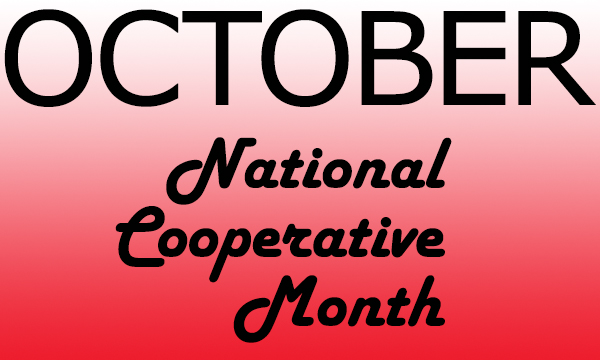Celebrating National Co-op Month
Oct 02, 2020
Megan Hasenour | Marketing Communications Manager

National Co-op month has been celebrated every October for over 50 years. It allows cooperative businesses to celebrate and reflect on their shared principles and educate others on the significance of being a part of a cooperative.
What is a Cooperative?
A cooperative is a private business organization that is owned and controlled by the people who use its products, supplies and/or services. Cooperatives vary in type and membership size, all cooperatives were formed to meet the specific objectives of members and are structured to adapt to a member’s changing needs.
Ag Co-ops
Farmers started forming co-ops nearly a century ago. They pooled their resources, put up storage bins and gained leverage with buyers.
Agriculture cooperatives have made an impact on food systems around the world for generations. Farmers in a cooperative make decisions together and share profits among all members, rather than outside investors. Income from farmer-owned co-ops is reinvested into the business or returned to the members. Farm co-ops are essential to support local communities and their economies.
Key Co-op Facts
Every year, animal, dairy and produce farms choose to forego traditional ownership and adopt a cooperative business model.
A cooperative business can operate in nearly any industry or sector. Co-ops are more popular in the following areas:
Ag co-ops have existed for as long as people have been farming. Early farmers needed to secure land and supplies to start their operation. In a cooperative, members would pool their financial resources and expertise to support each other’s farms.
A farm cooperative involves a network of member farmers who reap many benefits of doing business as a unit. Individual farms work together to buy necessary supplies and services. Farmers save costs and access goods and services otherwise unavailable to them.
In a farmer-owned cooperative, like minded producers help build a better local economy in the communities they serve.
Why Co-ops Matter
Cooperatives offer multiple benefits to their members and the community around them. From a business point of view, cooperatives offer their members the benefit of limited liability.
Cooperatives matter today because they help rebalance power and dilute the concentration of wealth. In the U.S., the wealthiest 1% of households have more wealth than 90% of the households. The cooperative model is one that creates shared prosperity, allowing more people to participate in the economy. Instead of a few people owning the bulk of every business, ownership resides with the people.
Source: National Cooperative Business Association

National Co-op month has been celebrated every October for over 50 years. It allows cooperative businesses to celebrate and reflect on their shared principles and educate others on the significance of being a part of a cooperative.
What is a Cooperative?
A cooperative is a private business organization that is owned and controlled by the people who use its products, supplies and/or services. Cooperatives vary in type and membership size, all cooperatives were formed to meet the specific objectives of members and are structured to adapt to a member’s changing needs.
Ag Co-ops
Farmers started forming co-ops nearly a century ago. They pooled their resources, put up storage bins and gained leverage with buyers.
Agriculture cooperatives have made an impact on food systems around the world for generations. Farmers in a cooperative make decisions together and share profits among all members, rather than outside investors. Income from farmer-owned co-ops is reinvested into the business or returned to the members. Farm co-ops are essential to support local communities and their economies.
Key Co-op Facts
Every year, animal, dairy and produce farms choose to forego traditional ownership and adopt a cooperative business model.
- 2 million farmers are members of more than 2,100 co-ops in the U.S.
- There are more than 1.2 million ag co-ops across the globe
- Farm co-ops generate about $6.5 billion in net income each year.
- Most of the top ag co-ops are based in the Midwest.
- 12% of the human population are members of a co-op.
- About 10% of the world’s population, or around 280 million people are employed by co-ops.
A cooperative business can operate in nearly any industry or sector. Co-ops are more popular in the following areas:
- Agriculture
- Insurance
- Financial Services
- Grocery
- Education
- Healthcare
- Housing
- Utilities
Ag co-ops have existed for as long as people have been farming. Early farmers needed to secure land and supplies to start their operation. In a cooperative, members would pool their financial resources and expertise to support each other’s farms.
A farm cooperative involves a network of member farmers who reap many benefits of doing business as a unit. Individual farms work together to buy necessary supplies and services. Farmers save costs and access goods and services otherwise unavailable to them.
In a farmer-owned cooperative, like minded producers help build a better local economy in the communities they serve.
Why Co-ops Matter
Cooperatives offer multiple benefits to their members and the community around them. From a business point of view, cooperatives offer their members the benefit of limited liability.
Cooperatives matter today because they help rebalance power and dilute the concentration of wealth. In the U.S., the wealthiest 1% of households have more wealth than 90% of the households. The cooperative model is one that creates shared prosperity, allowing more people to participate in the economy. Instead of a few people owning the bulk of every business, ownership resides with the people.
Source: National Cooperative Business Association